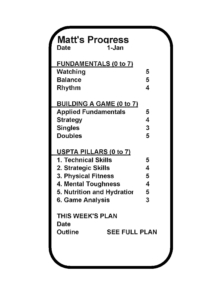Individual profiles for players serve several key advantages:
- A comprehensive record of a player’s tennis journey, including their skill level, strengths, and areas for improvement.
- Training programs and strategies are created to meet the specific strengths of each player.
- Players can track their progress over time to set realistic goals and measure the effectiveness of training methods.
Additionally, individual profiles foster accountability and motivation. Players can see their own growth and accomplishments, which can boost their self-esteem and drive to continue to develop their game.
Metrics (0 -7 scale)
Each player’s progress is ranked on a 0 – 7 scale, with 7 being the equivalent of an ATP professional.
Each player is ranked using metrics for Fundamentals, Building A Game and the USPTA Tennis Pillars benchmarks,
To establish a strong foundation and create a game plan for future success, Fundamentals and Building A Game, profiles use metrics from the elements in the Muir Tennis Academy curriculum.
For players to develop their full potential, each player is ranked against the six pillars of the United States Professional Tennis Association (USPTA) .
For privacy reasons, each player profile is assigned a pseudonym
and profiles are password protected.
USPTA’s Tennis Pillars
The USPTA “6 Pillars of Tennis Performance,” are considered a universal roadmap for player development. These pillars encompass various aspects of the game, both physical and mental, that are crucial for success in tennis.
1. Technical Skills: This includes mastering the fundamental strokes like forehand, backhand, serve, volley, and overhead. Good technique is essential for effective and efficient play.
2. Strategic Skills: Understanding strategies to outplay opponents, such as when to use certain shots, how to read the opponent’s game, and how to adapt during matches.
3. Physical Fitness: Tennis demands a high level of fitness, including strength, endurance, flexibility, and speed. This also encompasses injury prevention and recovery strategies.
4. Mental Toughness: Mental resilience is key in tennis, involving focus, handling pressure, maintaining confidence, and managing emotions during matches.
5. Nutrition and Hydration: Proper nutrition and hydration are vital for optimal performance and recovery.
6. Game Analysis: This involves a player reviewing their own matches and those of opponents to identify areas for improvement and to understand different playing styles.
Each pillar is integral to the development of a well-rounded tennis player.



